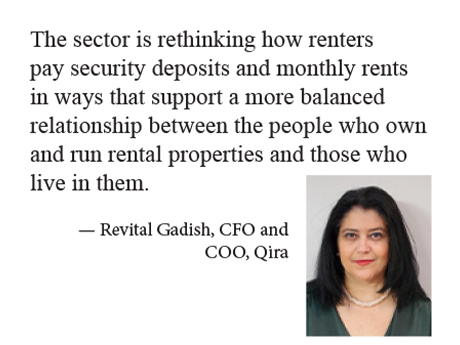— By Brian Ball and Revital Gadish, co-CEOs, Qira —
Much of the news about property technology (proptech) concerns the physical features of apartment buildings — for example, appliances such as smart thermostats that save energy and money, or keyless entry and monitoring systems that are more convenient and secure.
However, proptech also addresses intangible concerns, such as the societal push to give more power to renters in their relationships with owners and managers. The sector is rethinking how renters pay security deposits and monthly rents in ways that support a more balanced relationship between the people who own and run rental properties and those who live in them.
In January, the White House Domestic Policy Council and National Economic Council published a white paper titled “The Blueprint for a Renter’s Bill of Rights.” The principles outlined in the document encapsulate these goals, calling for housing security, stability and fairness for American renters. The Renter’s Bill of Rights puts forth five principles, which state that every renter deserves:
- Access to safe, quality, accessible and affordable housing,
- Clear and fair leases,
- Education, enforcement and enhancement of rights,
- The right to organize, and
- Eviction prevention, diversion and relief.
Although the Renter’s Bill of Rights did not create any new laws, the concept is likely to influence and inform upcoming legislation and regulatory agendas at the federal, state and local levels, so its contents are nonetheless relevant to many property owners and managers. Proptech companies have created solutions that support these principles for those seeking to navigate a reimagined system, and plan to improve and expand them.
For instance, consider the first principle’s concern with accessible and affordable housing. Indeed, many renters can’t afford large upfront deposits and fees, such as first and last-month rents and security deposits. Although the national average for security deposits is $800, many properties require more — often flatly requiring up to three months’ rent as a deposit.
Deposit alternatives enable property managers to eliminate traditional security deposits without assuming any financial risk. Renters pay low, percentage-based monthly fees (often 1 to 1.5 percent), while the proptech company assumes the financial risks and deposit management. If a renter leaves a damaged apartment, any dispute over how much of a security deposit is kept will be between the proptech company and the renter.
There is a ripple effect to policies like this. For example, a renter who does not have to pay a huge lump sum before getting an apartment can instead use those funds to repair a car that will allow them to drive to a new, better-paying job.
These services also address the second principle — clear and fair leases — by making the leasing process more transparent for renters. This technology lets renters view upcoming payments and seamlessly connect with their leasing team to ask any questions. Additionally, some proptech companies offer a background screening service that performs rental background and soft credit checks on potential residents. This service helps property managers find qualified renters while avoiding unintentional exclusion and discrimination.
Proptech apps can also enhance communication from the property owners. With proptech, residents can be given advanced notification for repairs, maintenance, unit entries and other activities, such as a non-renewal of lease. This helps residents feel more secure and ensures they have sufficient time to find new housing if their lease isn’t renewed.
Proptech services can be particularly useful for young and first-time renters who may need help adjusting to lease responsibilities. As these new renters become comfortable in a reimagined system, the tension between owners/managers and renters will ease — making both sides more comfortable with efforts of renters to organize and advocate for their needs.
The fifth principle is especially important in any effort to improve our society: eviction prevention, diversion and relief. “Renters should be able to access resources that help them avoid eviction, ensure the legal process during an eviction proceeding is fair and avoid future housing instability,” the white paper says. Pay Later features are built around this principle, as they help renters who are at risk of falling behind on rent manage a payback schedule, avoiding late fees and evictions.
Proptech services can make the biggest impact in this area. Apps can facilitate automatic rent payments, eliminating late fees. Delayed payment features allow property owners to be paid on time — keeping the renters safe from eviction — while the proptech company helps the renter catch up, again with low fees. Everyone wins in this situation: The property doesn’t have to find another renter; the renter stays in their home; and the eviction cycle doesn’t start turning.
This is an exciting time for proptech. It has a lot to offer the rental industry and its customers — and society at large.
Brian Ball and Revital Gadish are co-CEOs at Qira, a proptech company that manages rent collection, security deposits and other services for apartment properties and their tenants.


